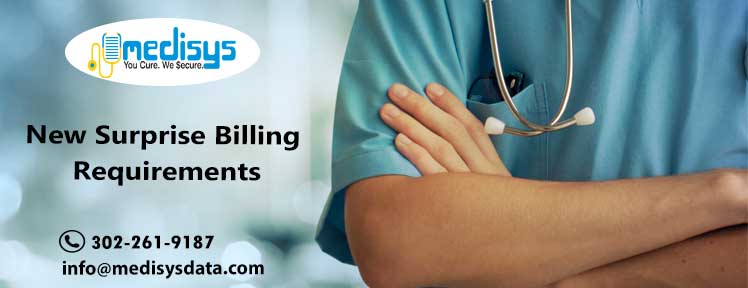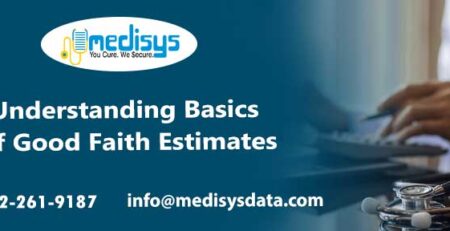The No Surprises Act prohibits nonparticipating providers and emergency facilities from billing patients for more than their applicable cost-sharing amounts for certain services, also known as balance billing. The prohibitions on balance billing and cost-sharing protections vary among providers depending on the type of services they furnish and their practice settings. The Centers for Medicare & Medicaid Services (CMS) has released Frequently Asked Questions (FAQs) on the No Surprises Act implementation, providing details about balance billing and notice and consent prohibitions. We shared new surprise billing requirements for reference only.
The Consolidated Appropriations Act of 2021 established several new requirements to protect consumers from surprise medical bills. These requirements are collectively referred to as “No Surprises” rules. These requirements generally apply to items and services provided to consumers enrolled in group health plans, group or individual health insurance coverage, and Federal Employees Health Benefits plans. Patients now have new billing protections when getting emergency care, certain non-emergency care from out-of-network providers during visits to certain in-network facilities, and air ambulance services from out-of-network providers.
New Surprise Billing Requirements
- No balance billing for out-of-network emergency medicine services
- No balance billing for non-emergency services by out-of-network providers during patient visits to certain in-network health care facilities, unless notice and consent requirements are met for certain items and services.
- Providers and health care facilities must publicly disclose patient protections against balance billing
- No balance billing for covered air ambulance services by out-of-network air ambulance providers
- In instances where balance billing is prohibited, cost sharing for insured patients is limited to in-network levels or amounts
- Providers must give a good faith estimate of expected charges to uninsured and self-pay patients at least 3 business days before a scheduled service, or upon request
- Plans and issuers and providers and facilities must ensure continuity of care when a provider’s network status changes in certain circumstances
Plans and issuers and providers and facilities must implement certain measures to improve the accuracy of provider directory information
Patient Protection against Balance Billing
A provider or facility must disclose to any participant, beneficiary, or enrollee in a group health plan or group or individual health insurance coverage to whom the provider or facility furnishes items and services information regarding federal and state (if applicable) balance billing protections and how to report violations.
Providers or facilities must post this information prominently at the location of the facility if the location is publicly accessible, post it on a public website (if applicable), and provide it to the participant, beneficiary or enrollee no later than the date and time on which the provider or facility requests payment from the individual or, with respect to an individual from whom the provider or facility does not request payment, no later than the date on which the provider or facility submits a claim to the group health plan or health insurance issuer.
Providing Good Faith Estimate
- When a health care provider or facility schedules an item or service, it must inquire if the individual who schedules an item or service is enrolled in a group health plan, group or individual health insurance coverage offered by a health insurance issuer, a federal health care program, or a Federal Employees Health Benefits plan. If so, the provider or facility must inquire if the individual is seeking to have their claims for the item or service submitted to the individual’s plan or coverage.
- If the patient has no such plan or coverage, or doesn’t intend to submit a claim to the plan or coverage, the provider or facility must provide notification to the patient (in clear and understandable language) of the good faith estimate of the expected charges, expected service, and diagnostic codes of scheduled services.
- The good faith estimate must include expected charges for the items or services that are reasonably expected to be provided in conjunction with the primary item or service, including items or services that may be provided by other providers and facilities.
- If the patient is enrolled in such plan or coverage, and intends to have a claim submitted for the scheduled items or service, the provider or facility must submit a good faith estimate to the plan or issuer, which in turn must send an advance explanation of benefits to the patient.
Generally, the No Surprises protections apply to individuals enrolled in a health care plan, through an employer (whether self-funded or insured, including coverage offered by federal, state, or local governments, or a multiemployer plan), or through the federal Marketplaces, state-based Marketplaces, or directly through an individual market health insurance issuer. The rules don’t apply to people with coverage through programs like Medicare, Medicaid, Indian Health Services, Veterans Affairs Health Care, or TRICARE.
We shared crucial information about No Surprises Act (NSA), new surprise billing requirements, balance billing, and good faith estimate for reference purpose only; you can refer following link for detailed information about no surprises rule. Medisys Data Solutions is a leading medical billing company providing complete assistance in medical billing and coding. If you need any assistance in billing, contact us at info@medisysdata.com/ 302-261-9187.
Reference: FAQs for Providers about No Surprised Act














